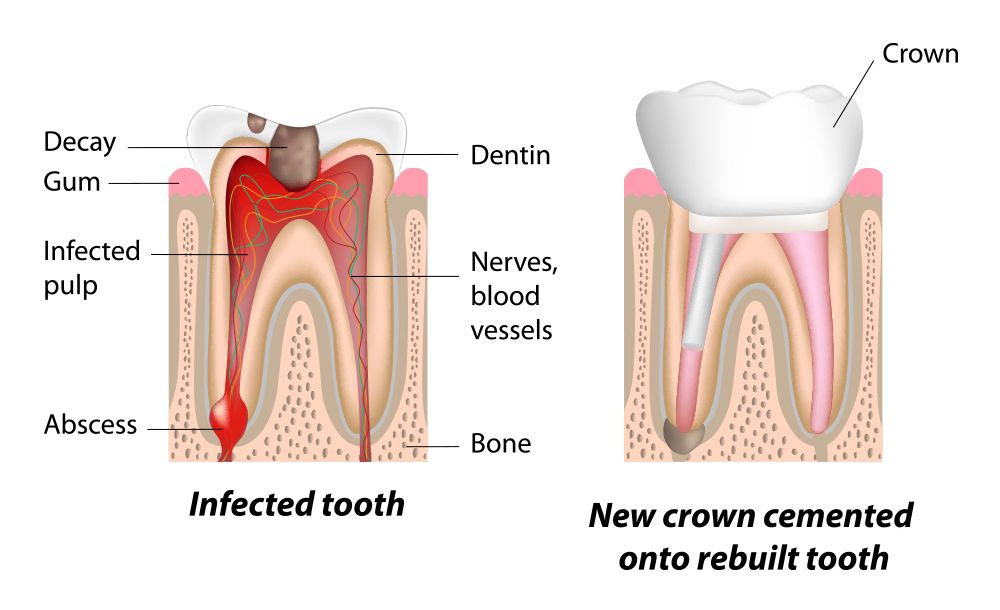Uncovering the Dangers of Root Infection: Causes, Symptoms, and Treatment Options – by Dr. Shipra Agrawal
Introduction: Root infection, also known as apical periodontitis, is a common dental condition that occurs when bacteria penetrate the root canal of a tooth, leading to inflammation and infection. If left untreated, root infections can cause severe pain, damage to the tooth structure, and even spread to other parts of the body. In this article, we will delve into the causes, symptoms, and treatment options for root infections, providing valuable insights into this dental concern. Dr. Shipra Agrawal, a respected dental professional, shares her expertise to help you understand and address root infections effectively.

Causes of Root Infection: Dr. Agrawal explains that root infections typically result from untreated dental decay or injury to the tooth. The following factors can contribute to the development of a root infection:
- Dental Decay: When dental decay progresses deep into the tooth, it can reach the root canal, allowing bacteria to enter and cause an infection.
- Tooth Trauma: Fractured teeth or injuries that expose the root canal can provide a pathway for bacteria to invade and infect the tooth pulp.
- Failed Dental Procedures: In some cases, previous dental treatments such as fillings or crowns may not adequately seal the tooth, leaving it vulnerable to bacterial invasion.
Symptoms of Root Infection: Root infections can produce various symptoms, ranging from mild discomfort to severe pain. Dr. Agrawal highlights the following common signs:
- Persistent Toothache: A severe and persistent toothache, often throbbing in nature, is a common symptom of a root infection. The pain may worsen when biting or applying pressure on the affected tooth.
- Sensitivity to Temperature: Sensitivity to hot or cold foods and beverages is another indication of a root infection. The tooth may exhibit heightened sensitivity when exposed to temperature extremes.
- Swelling and Abscess Formation: In some cases, the infected tooth or surrounding gum tissue may become swollen and tender. The presence of an abscess, which appears as a pus-filled sac, can also indicate a root infection.
- Discoloration and Gum Changes: The affected tooth may exhibit discoloration, appearing darker than the surrounding teeth. Additionally, the gum tissue around the infected tooth may appear red, swollen, or receding.
Treatment Options for Root Infection: Timely treatment is essential to prevent the spread of infection and preserve the affected tooth. Dr. Agrawal outlines the following treatment options for root infections:
- Root Canal Treatment: Root canal therapy is a common procedure to remove infected pulp and bacteria from the root canal. The tooth is then thoroughly cleaned, disinfected, and sealed to prevent reinfection. This treatment aims to save the tooth and alleviate pain.
- Dental Crown Placement: After a root canal procedure, a dental crown may be recommended to protect and strengthen the treated tooth. A crown restores the tooth’s functionality and provides long-term durability.
- Antibiotics: In some cases, if the infection is severe or has spread beyond the tooth, antibiotics may be prescribed to help eliminate the infection. However, antibiotics alone are not sufficient to fully treat root infections, and they are typically used in conjunction with other dental treatments.
- Tooth Extraction: In rare cases where the infection is severe and the tooth cannot be saved, tooth extraction may be necessary. The extracted tooth can then be replaced with a dental implant or bridge to restore function and aesthetics.
Prevention and Oral Hygiene: Dr. Agrawal emphasizes the importance of preventive measures and maintaining good oral hygiene to reduce the risk of root infections. This includes:
- Regular Dental Check-ups: Routine dental examinations and cleanings help detect and address dental issues early, preventing the progression of decay or damage to the tooth.
- Proper Oral Hygiene Practices: Brushing twice a day, flossing daily, and using an antiseptic mouthwash help remove plaque and bacteria, reducing the risk of tooth decay and infection.
- Addressing Dental Issues Promptly: Any signs of tooth decay, injury, or tooth sensitivity should be promptly addressed by a dentist to prevent the development of root infections.
Conclusion: Root infections can cause significant dental pain and compromise oral health if left untreated. Recognizing the causes, symptoms, and available treatment options is crucial for effectively addressing root infections. Dr. Shipra Agrawal, a skilled dental professional, encourages regular dental care and emphasizes the importance of timely intervention to preserve dental health and overall well-being.
For more info. please visit : https://www.ahrihospital.com/



